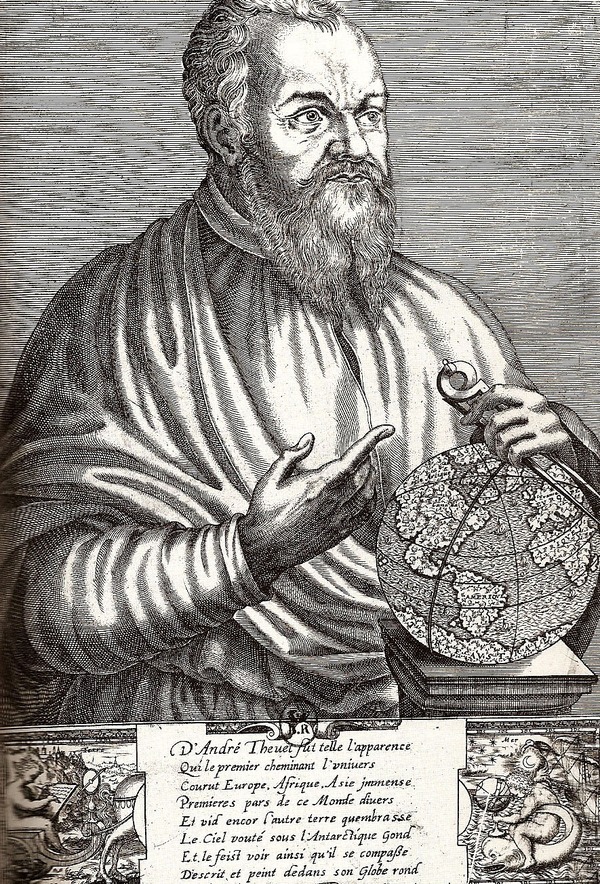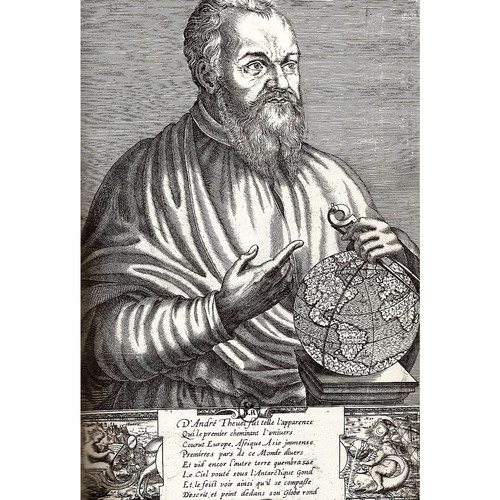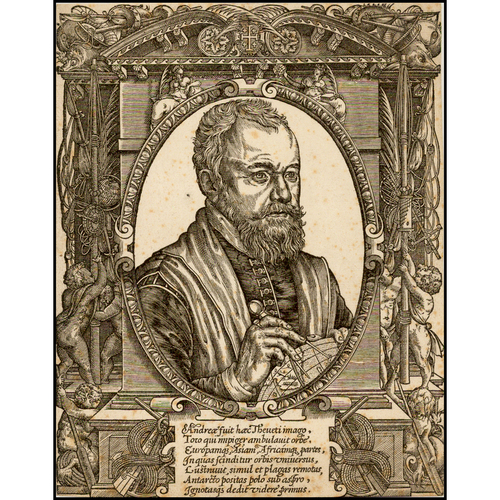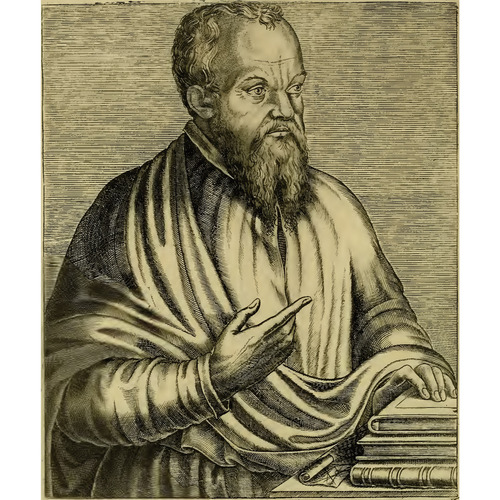
Source: Courtesy of Wikimedia Commons
THEVET, ANDRÉ, Franciscan friar, first French historian to describe America; b. 1516 in Angoulême, son of Étienne Thevet, barber-surgeon; d. 23 Nov. 1592 in Paris.
Thevet embarked for the Orient c. 1537, where he travelled for five or six years. He claimed to have come to America in 1550 with the pilot Guillaume Testu but this statement is now generally considered to be false. From 10 Nov. 1555 to 31 Jan. 1556 he was in Brazil as almoner to Villegaignon, vice-admiral of Brittany, who had gone there to establish a French colony. Elevated to the position of almoner to Catherine de Médicis, he later became historiographer and cosmographer to the king. A bogus scholar and a naive compiler of facts, he recorded indiscriminately everything he read or heard, while at the same time creating the impression that he himself had actually visited the countries (including North America) that he described.
Two works of Thevet are of direct concern to Canada: his manuscript “Le grand insulaire et pilotage d’André Thevet . . .” (BN, MS Fr. 15452–53) and Les singularitez de la France antarctique, autrement nommée Amérique . . . (Paris, 1558). Although Thevet himself never came to Canada, he was able to use, to a large extent, Cartier’s Brief récit & succincte narration. . . , 1545. He also availed himself of the works of Jean Fonteneau (Jean Alfonse). Nevertheless, information supplied by Thevet, often resting on no known written source, has been proved by present-day scholars to be exact. He was the first, for example, to publicize the place-names Tadoussac, Anticosti, and Miramichi; and to give important details about the warfare between the First Nations of the St. Lawrence valley, the accuracy of which has been substantiated in Champlain’s writings. It is clear that Thevet talked with explorers; that he was host to Cartier in Saint-Malo; that he cited the latter as his verbal source at various points in his writings; and that he must also have questioned the indigenous people whom Cartier had brought back to France and perhaps fishermen who had returned from the Gulf of St. Lawrence. In the course of these investigations he accumulated data to be found in no other sources, even though these are studded with gross errors and contradictions. In an evaluation of Thevet’s work, Bernard G. Hoffman concludes that Thevet is “an amazing source” and that “Le grand insulaire” and Les singularitez de la France antarctique remain of inestimable value for the ethnography of eastern Canada.
André Thevet, Cosmographie universelle; Les singularitez de la France antarctique, autrement nommée Amérique: & de plusieurs terres & isles découvertes de nostre temps (Paris, 1558; autre éd., Anvers, 1558; éd. Paul Gaffarel, Paris, 1878). The 1878 edition also contains a biographical note, v-xxxiii, repr. in part in BRH, XVIII (1912), 321–33. Biggar, Early trading companies, 231–42. Ganong, “Crucial maps,” i, 109–29. Hoffman, Cabot to Cartier, 171–79.
Revisions based on:
Frank Lestringant, Sous la leçon des vents: le monde d’André Thevet, cosmographe de la Renaissance (Paris, 2003).
Cite This Article
Marcel Trudel, “THEVET, ANDRÉ,” in Dictionary of Canadian Biography, vol. 1, University of Toronto/Université Laval, 2003–, accessed September 18, 2024, https://www.biographi.ca/en/bio/thevet_andre_1E.html.
The citation above shows the format for footnotes and endnotes according to the Chicago manual of style (16th edition). Information to be used in other citation formats:
| Permalink: | https://www.biographi.ca/en/bio/thevet_andre_1E.html |
| Author of Article: | Marcel Trudel |
| Title of Article: | THEVET, ANDRÉ |
| Publication Name: | Dictionary of Canadian Biography, vol. 1 |
| Publisher: | University of Toronto/Université Laval |
| Year of publication: | 1966 |
| Year of revision: | 2021 |
| Access Date: | September 18, 2024 |





